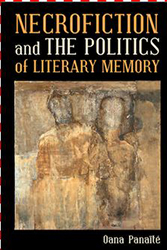Contemporary literature gathers in a commemorative site the remains of H/history and its own story by erecting literary tombs. Necrofiction and The Politics of Memory argues that current narratives of the aftermath enable writers to honour the past while casting off its burdensome legacy, and to dismantle while reassembling affective, political, and aesthetic communities. The genre is defined and discussed in relation to other literary forms such as trauma writing, historical novels, archival narratives, biofiction, or field literature. Necrofiction fulfils in distinct ways the social and artistic function of an individual or collective act of remembrance of a lost family member or a historical figure. At the same time, it offers a creative space in which the authors can overcome the burden of literary tradition by incorporating existing models and devices into their own poetic art while as demonstrated by the works of five writers whose personal and artistic trajectories transcend political, cultural, and linguistic frontiers: Linda Lê, Patrick Modiano, Assia Djebar, Patrick Chamoiseau, and Maylis de Kerangal. By examining the ways in which fiction both reflects and resists what Achille Mbembe has defined as “necropolitics,” Necrofiction and The Politics of Memory delves into the contentious yet intimate relationship between singular models of literary remembrance and the frameworks of hegemonic discourses.
Necrofiction and The Politics of Literary Memory
Necrofiction and The Politics of Literary Memory
- Oana Panaïté
- Publication Date
2022 - Website
- View the book on liverpooluniversitypress.co.uk


 The College of Arts
The College of Arts